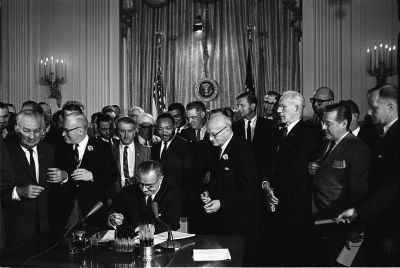Advancing the Dream: 8 notable Civil Rights victories
4. Civil Rights Act of 1964

During the 1960s, in response to a wave of racial discrimination and violence, especially in the South, Congress debated passing a new federal law to protect civil rights for minorities.
In 1964, almost 100 years after the Civil Rights Act of 1866 was passed, Congress passed Public Law 88-352 (78 Stat. 241), with President Lyndon Baines Johnson signing it into law.
The Civil Rights Act of 1964 prohibited discrimination on the basis of multiple identities, including race, religion, sex and national origin. It also banned discrimination regarding public accommodations and federally funded programs, and provided greater enforcement of voting rights and school desegregation.
“The Civil Rights Act of 1964 is the nation's benchmark civil rights legislation, and it continues to resonate in America,” stated the Office of the Assistant Secretary for Administration & Management at the U.S. Department of Labor.





















